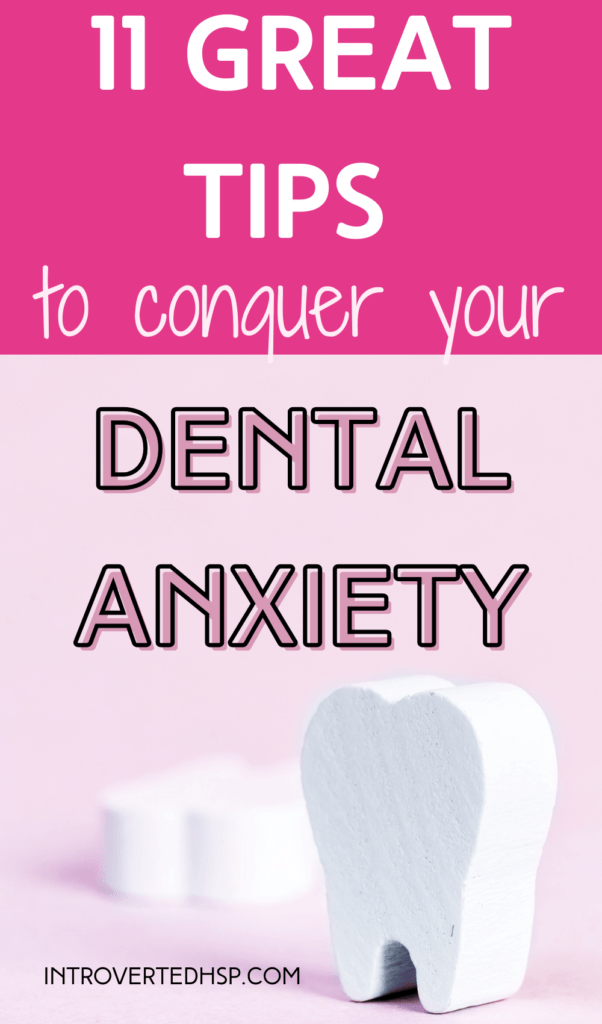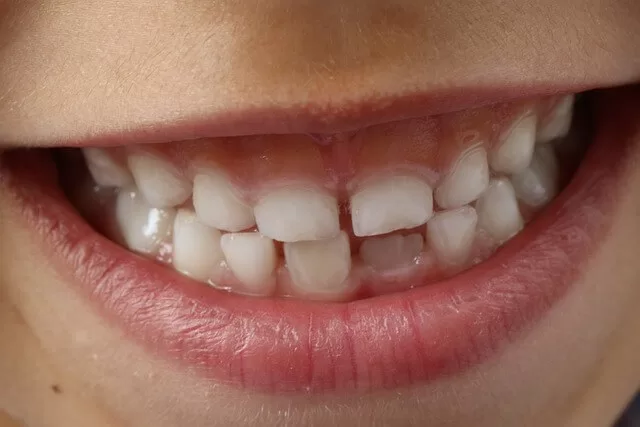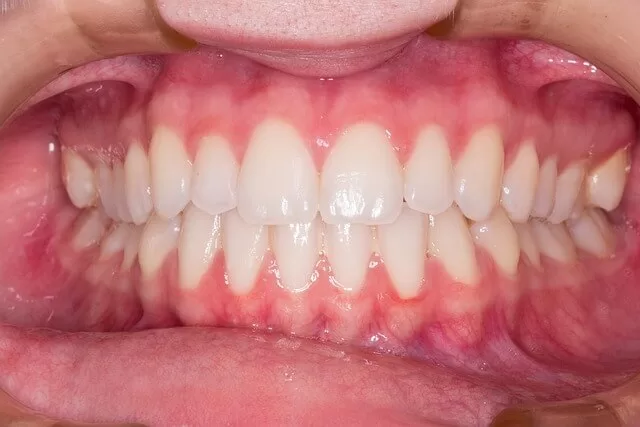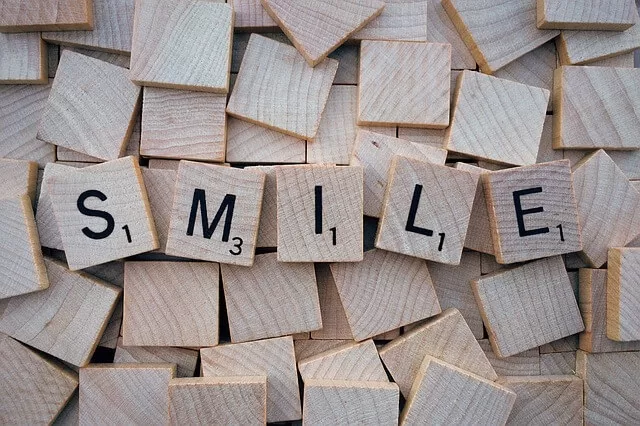Feeling anxious about going to the dentist or having dental anxiety sucks. Getting your yearly recall and starting to sweat because you are already panicking isn’t how it should be. But that’s unfortunately how it goes for many people.
I’m not telling you that going to the dentist should be your favorite thing (although that would be nice for dental professionals), but for your dental and general health, it must be done.
If you are the type of person who keeps postponing your dental visit until it has been more than a decade, please follow these tips and get yourself to show up to get your teeth and mouth checked by a professional.
The tips I share with you will make it easier to go to the dentist step by step. So keep reading if you need some help with your dental anxiety.

This post may contain affiliate links, which means if you make a purchase through these links, I may receive a small commission at no extra cost to you. As an Amazon Associate I earn from qualifying purchases. Please read my disclosure for more info.
What is causing your dental anxiety?
If you are thinking that you are alone with your dental anxiety, I can assure you that you certainly aren’t. Tons of people have a form of dental anxiety and it can sometimes even develop into a dental phobia.
Dental anxiety in children

When children first start going to the dentist, you see a lot of different behaviors that are unique to each child. You can start going to the dentist with kids from the age of 2,5 years to get them used to the dental visit. Some kids will like the experience and let the dentist look at their teeth very well, others will refuse to open their mouth entirely.
You can prepare your child by reading some books with them about going to the dentist. The book The Dentist’s Dragons – Going to the First Dental Check-up is great to read with your child before the first visit.
Anxiety from a young age is mostly fear of the unknown and is more seen in children who are generally more anxious or when parents are frightened of the dentist and let their children see their fear. When parents show their dental anxiety to their children, they will think that the dentist is to be feared even though they haven’t had their own experience yet.
As a parent, you are responsible for the dental health of your child, if you take care of their teeth from a young age and make sure they don’t get any cavities, they probably won’t develop dental anxiety starting from their childhood. So plan that check-up with the dentist from the age of 2,5 years and do your best at home to take care of their teeth.
If they do develop some cavities, get them to see a pediatric dentist to give them the best experience possible at the dentist.
Dental anxiety in adults

When you are an adult with dental anxiety, you could have gotten it from a bad experience when you were a child or again because you are more of an anxious person generally.
When you have had a traumatic experience as a child or even as an adult, like not getting entirely numb during a procedure or maybe having a terrible relationship with your dentist where there is no trust at all, you can still fix this.
Dental anxiety is mostly caused by fear of pain, fear of losing control, and fear of pain after the dental procedure. Most people don’t like going to the dentist and it is uncomfortable sometimes, but it is so important for your health!
So let’s see how you can conquer your dental anxiety and make going to the dentist a more pleasant experience.
11 great tips to overcome your dental anxiety
1. Tell your dentist why you have dental anxiety
As I mentioned before, there are plenty of different reasons why you might have dental anxiety. So first of all, let your dentist know that you are feeling anxious and share with them the specific reason or reasons why you are feeling this way.
You can also ask them nicely to make some adjustments for you, like giving you more information about the things they are about to do or being extra gentle with the anesthesia and maybe using a pre-numbing agent to apply topically before the actual anesthesia so you don’t feel the needle as much.
Dental professionals want to let the treatment go as smoothly as possible, so if you need a few adjustments to ensure this, they most likely want to do that for you.
2. Get support from a loved one
When you are feeling anxious, you might not want to go to your dental appointment and stay home. This is definitely not the way to go, as your dental anxiety will probably only grow this way in the long run and your dental health could suffer.
Tell a loved one (relative or friend) that you have a dental appointment and you want them to come with you to ensure that you are going. If this is the only way you see yourself going through with the appointment, you should do it like this.
Having someone who supports you will calm your anxiety a little and maybe after some time, you are able to do this alone if you are getting enough positive experiences at the dentist.
If you don’t have someone to do this with you, you might try some of the other tips on this list.
3. Breathing exercises
Slow breathing calms down your nervous system when you are in fight or flight mode. Focus on taking deep breaths before your visit to calm down your dental anxiety. To really calm yourself down, you should try to make the exhales longer than the inhales. Keep doing this until you feel more calm.
When you are deep down in anxiety lane, it might not be so easy to focus on your breathing. That’s when an appliance like this Moonbird Breathing and Meditation Device may come in handy to calm you down.
It really helps, I have seen it work with children who are crying their eyes out and when we get them to focus on their breath and their belly moving up and down, they get more at ease and we can do the procedure.
When you go to the dentist, make sure you can breathe through your nose, so if you have a cold or something that blocks your nose, cancel the appointment and reschedule.
4. Distraction
When you don’t have to perform something, like when you are going to the dentist, you just have to undergo procedures, you can lower your anxiety with different types of distraction.
A good type of distraction during your dental appointment can be listening to music or an audiobook. Put your earphones in from the moment they start working in your mouth and listen to them so you are distracted from what is happening inside your mouth. Make sure to ask your dentist if this is okay to do but normally, as I mentioned before, they just want to work smoothly so if this helps you to relax, they won’t mind.
Some dentists might already have VR glasses to distract anxious patients but it’s not widely used at this time. Other dentists have screens hanging in the ceiling to watch something while being treated. Find a practice that helps you distract from the procedure if this helps you.
5. Exposure therapy
Exposure therapy is very often used to treat anxiety and even phobias. It is a technique where you face your fears step by step so it doesn’t become too overwhelming to take steps and make progress.
So how does exposure therapy look when you are applying it to your dental anxiety? You can start by visiting the website of your dentist and making a check-up appointment without any treatment, you can ask your dentist only to do a check-up and do the cleaning at another appointment if that scares you more.
When there is a lot of dental work that needs to be done, start with the things you feel most comfortable with and maybe ask for shorter appointments if you dread sitting in the chair for hours on end. Or maybe you prefer less long appointments over many short ones.
You will feel fear in your first few appointments, but it might come down if they went well and you didn’t have any pain. But if you are still too scared to go in and get your procedures done, keep reading and maybe consider the following tips.
6. Ask for anti-anxiety drugs
There are plenty of anti-anxiety drugs out there and dental anxiety is one of the reasons you might consider taking them.
Xanax is a well-known anti-anxiety drug that shouldn’t be used every day because of its addictive capacity, but when you only have to take it before your dental appointments, you might consider it.
Ask your dentist for his or her advice on taking anti-anxiety medication pre-treatment. If this helps you calm down so they can work more efficiently, it’s a win-win. You can also ask your general physician about this if you need to take it before your first dental appointment.
7. Try oral sedation
When everything else fails you that I mentioned before in this list, maybe you can try oral sedation to help you conquer your dental anxiety. Not every dentist uses this, so you should find one that does and know that it will cost you some extra money.
Oral sedation helps you relax by breathing in laughing gas and calms you down. You will still be conscious while being sedated so it’s not like general anesthesia where you don’t notice anything at all. This means that if you have dental anxiety, it can help you greatly, but if you have a proper dental phobia, it might not be enough to calm you down.
I should also note that oral sedation can’t be used for every procedure because there will be a nose mask that can be in the way of certain procedures, so if you want to try it, ask if it is possible for the procedure you need to get done.
Talk about this with your dentist and see if this is the right thing to do for you.
8. Find the right dentist for you
There are so many different types of dentists in the world. You have different specialists and general dentists, but you also have dentists who specialize in treating children or people with dental anxiety.
Find yourself a dentist who has a good reputation for treating patients with anxiety. Group practices are becoming the norm and there is probably at least one dentist who is very careful and has a lot of patience and wants to help you get over your dental anxiety together.
Unless you are really phobic, you don’t need a dentist who specializes in dealing with anxious patients, because a lot of patients experience dental anxiety and most dentists will have experience in dealing with it. You just need a dentist that you can trust and has a gentle approach.
If you don’t feel good with your dentist the first time you meet, you can always ask to go to another one next time. It’s really important that you feel good about your dentist so that there is a trust bond.
9. Go to your yearly check-up
Do not skip your yearly check-up! I know it’s appealing to skip it, as your anxiety will go down immediately after canceling, but you are not truly helping yourself by doing so!
Going to the dentist every year or maybe even every 6 months will lower the chance of finding big problems in your mouth and this way. This way, dental problems can be prevented or they can be found in an early stage and treated when they are still small and easy to fix.
I would recommend seeing a dentist who takes X-rays regularly, as many cavities are missed when they only rely on their vision. Once a year or once every two years should be good for most people.
It’s also the perfect time to let your teeth get cleaned professionally so that you don’t develop periodontal problems. Prevention is key and therefore you should see your dentist regularly.
It will also be way less scary to go every year than when you haven’t been in 5 years and are scared of all the problems that might have developed over the years.
10. Take good care of your teeth
If you take great care of your teeth, chances are that you only need your check-up once a year and don’t spend many hours in the dental chair at all. This is also good for your finances as dental care is expensive as well!
When you listen to the advice your dentist gives you, brush with an electric toothbrush twice a day for at least 2 minutes, and floss or use interdental brushes every single day, your dental hygiene must rock (if you do it correctly of course).
Next to those wonderful oral hygiene habits, it’s also important to watch your food intake to eat no more frequently than 5 times a day, and limit drinks that aren’t water to a minimum.
If you still have issues after taking the best care for your teeth, you might have other problems that are causing cavities like hidden reflux that comes from your stomach or maybe you are a teeth grinder and need help from your dentist for that. Find a dentist you can trust and work together as a team to care for your mouth.
11. Get psychological help
When all the tips I mentioned above fail and you still can’t get to see a dentist, you should try getting psychological help.
Dental anxiety is a battle of the mind and psychotherapists or psychologists can probably help you overcome it if you find someone that specializes in anxiety treatment.
Not being able to go see a dentist out of fear can have a very negative impact on your life, this won’t be visible immediately but after a while, you might notice problems start to pile up and you can no longer afford the dental treatment you need because it has gotten so complex over time.
Get the help you need to take care of yourself, you deserve this!
Conclusion

As someone who has worked in dentistry, I came across many patients with dental anxiety. I always felt for them because I was only there to help them and they were so afraid of everything.
I think you can lower your dental anxiety by applying some of the tips I mentioned in this article and if you find a dentist you trust, it might disappear altogether after a while.
Dental health is so important, everyone wants a nice white set of straight teeth these days, but before any legitimate dentist will help you get there, your teeth must be healthy to start with. You want to be able to eat without feeling pain and socialize without being ashamed of your teeth.
I hope this blog post helps you to conquer and lower your dental anxiety and helps you to take better care of your teeth. Lots of courage getting there!
Please let me know if any of my tips were helpful to you and if you have more tips to help others, share them in the comment section below 🙂
